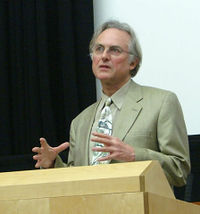Machismo
 From Conservapedia
From Conservapedia Machismo is usually described as a strong sense of masculine pride or an exaggerated masculinity.[1] Another definition of machismo is an "exhilarating sense of power or strength."[2]
Some of the Old Testament heroes display machismo such as Samson.[3]
Contents
- 1 Religious conservatives and mental toughness
- 2 Atheist controlled, mainland China admits its men have become too feminine. China promotes education drive to make boys more 'manly'
- 3 Quote relating to the new atheist Richard Dawkins and machismo
- 4 Atheism, penile cancer and machismo
- 5 See also
- 6 References
Religious conservatives and mental toughness[edit]
See also: Atheism and mental toughness
Religious people tend to be more conservative.[4] In addition, religious people have more mental toughness (See: Atheism and mental toughness and Atheism and cowardice).
According to the journal article about the brain differences between political conservatives, liberals and moderates entitled Functional connectivity signatures of political ideology which was published in PNAS Nexus, "conservatives tend to be more resilient and have better self-control".[5]
For more information, please see: Atheism and mental toughness
Atheist controlled, mainland China admits its men have become too feminine. China promotes education drive to make boys more 'manly'[edit]
See also: Atheism and China and Atheism and mental toughness
China has the world's largest atheist population and practices state atheism.[6][7] China has one of the highest rates of atheism in the world.[8][9]
In 2021, the BBC reported that the mainland Chinese government indicated that its men have become too feminine.[10] As a result, China promotes education drive to make boys more 'manly'.[11]
The BBC article also stated: "Last May, a delegate of China's top advisory body, Si Zefu, said that many of China's young males had become 'weak, timid, and self-abasing.'"[12]
Quote relating to the new atheist Richard Dawkins and machismo[edit]
See also: Atheism and cowardice and Atheism and mental toughness
An excerpt from Richarddawkins.net that was is also quoted from a column at Independent.ie:
| “ | So Mary Kenny thinks that there are more atheist men than women, and that this is the result of some sort of attempt at overt manliness on their part. She really must try to pay attention - to Richard Dawkins, for example whom one could hardly describe as being the epitome of machismo."[13][14] | ” |
In The Daily Telegraph article Dr. Daniel Came, a member of the Faculty of Philosophy at Oxford University was quoted as writing to fellow atheist Richard Dawkins concerning his refusal to debate Dr. William Lane Craig, "The absence of a debate with the foremost apologist for Christian theism is a glaring omission on your CV and is of course apt to be interpreted as cowardice on your part."[15]
After the Elevatorgate controversy, the new atheist Richard Dawkins chose to complain about being bullied by feminists rather than being stoic about the situation and the Washington Post reported on November 18, 2014:
| “ | “I don’t take back anything that I’ve said,” Dawkins said from a shady spot in the leafy backyard of one of his Bay Area supporters. “I would not say it again, however, because I am now accustomed to being misunderstood and so I will . “
He trailed off momentarily, gazing at his hands resting on a patio table. “I feel muzzled, and a lot of other people do as well,” he continued. “There is a climate of bullying, a climate of intransigent thought police which is highly influential in the sense that it suppresses people like me.” Recent criticism of Dawkins has come from women, many of them within the atheist movement, which has long drawn more men to its ranks. His online remarks, some women say, contribute to a climate they see as unwelcoming to female atheists. Writing for Salon last month, atheist activist Amanda Marcotte said: “People like Dawkins . are the public face of atheism. And that public face is one that is defensively and irrationally sexist..." Some atheist men, too, are unhappy with Dawkins’ most recent remarks[16] |
” |
[edit]
See: Richard Dawkins and his stress related stroke
Atheism, penile cancer and machismo[edit]
See also: Atheism and penile cancer

The medical journal article Risk Factors and Prevalence of Penile Cancer states:"...in a society where masculinity is defined by and associated with the presence of the phallus, penile cancer affects male self-esteem and may lead to depression. The vexing issue with penile cancer lies in the fact that it is a largely preventable disease, where significant risk factors are modifiable."[17] See also: Atheism and depression and Atheism and self-esteem
According to WebMD, "Penile cancer, or cancer of the penis, is when cells grow out of control on or in a man’s penis."
There are a number of practices positively correlated to atheism/irreligion that increases an individuals risk for penile cancer (see: Atheism and penile cancer).
Some of the risk factors related to the development of penile cancer are: lack of male circumcision, sexual promiscuity, HPV virus, AIDS, homosexuality (see: Homosexuality and AIDS), smoking, obesity, being over the age of 60, and bestiality.[18] See: Atheism and bestiality
The medical journal article Risk Factors and Prevalence of Penile Cancer states: "...in a society where masculinity is defined by and associated with the presence of the phallus, penile cancer affects male self-esteem and may lead to depression. The vexing issue with penile cancer lies in the fact that it is a largely preventable disease, where significant risk factors are modifiable."[19]
See also: Atheism and depression and Atheism and self-esteem
The Telegraph reported: "Patients with a strong “intrinsic faith” (a deep personal belief, not just a social inclination to go to a place of worship) recover 70 per cent faster from depression than those who are not deeply religious."[20]
Concerning atheism and depression, a University of Michigan study involving 19,775 individuals found that religious people are less likely than atheists to suffer depression when they are lonely.[21] See also: Atheism and suicide
There are preliminary studies indicating that individuals who reject Christianity in Western cultures have lower self-esteem than the Christian population.[22][23] There are also studies indicating that lower self-esteem is associated with suicidality.[24][25] Atheists have higher rates of suicide than the general population.[26][27][28] At the same time, there is a significant portion of the atheist population who suffer from excess self-esteem/pride issues (see: Atheism and arrogance).
See also[edit]
Humor:
References[edit]
- ↑ https://www.merriam-webster.com/dictionary/machismo
- ↑ Machismo
- ↑ http://www.all-creatures.org/hr/what-06.htm
- ↑ FACTCHECKED: RELIGIOUS PEOPLE ARE MORE CONSERVATIVE, WORLDWIDE, Eternity News website, 2020
- ↑ Functional connectivity signatures of political ideology by Seo Eun Yang, James D Wilson, Zhong-Lin Lu, Skyler Cranmer, PNAS Nexus, Volume 1, Issue 3, July 2022, pgac066, https://doi.org/10.1093/pnasnexus/pgac066, Published: 23 May 2022
- ↑ Top 50 Countries With Highest Proportion of Atheists / Agnostics (Zuckerman, 2005)
- ↑ A surprising map of where the world’s atheists live, Washington Post By Max Fisher and Caitlin Dewey May 23, 2013
- ↑ Top 50 Countries With Highest Proportion of Atheists / Agnostics (Zuckerman, 2005)
- ↑ A surprising map of where the world’s atheists live, Washington Post By Max Fisher and Caitlin Dewey May 23, 2013
- ↑ China promotes education drive to make boys more 'manly', BBC, 2021
- ↑ China promotes education drive to make boys more 'manly', BBC, 2021
- ↑ China promotes education drive to make boys more 'manly', BBC, 2021
- ↑ Atheist men and women, Op-ed, ALAN BOURKE, CHARLESLAND COURT, GREYSTONES, CO WICKLOW, Independent.ie website
- ↑ Taken from a forum post at Richard Dawkins' ex-forum
- ↑ Richard Dawkins accused of cowardice for refusing to debate existence of God, The Daily Telegraph, May 14, 2011
- ↑ Richard Dawkins stands by remarks on sexism, pedophilia, Down syndrome, by Kimberly Winston | Religion News Service November 18, 2014 and syndicated to the Washington Post
- ↑ Risk Factors and Prevalence of Penile Cancer, West Indian Med Journal. 2014 Oct; 63(6): 559–560, Published online 2015 Jul 28. doi: 10.7727/wimj.2015.381
- ↑
- Risk Factors for Penile Cancer
- Penile Cancer, WebMD
- Increased Risk of Penile Cancer among Men Working in Agriculture, Asian Pac J Cancer Prev. 2018; 19(1): 237–241. doi: 10.22034/APJCP.2018.19.1.237
- Obesity is associated with increased risk of invasive penile cancer , BMC Urol. 2016; 16: 42. Published online 2016 Jul 13. doi: 10.1186/s12894-016-0161-7
- Sex with Animals (SWA): Behavioral Characteristics and Possible Association with Penile Cancer. A Multicenter Study
- Bestiality linked to penile cancer, Medical Xpress website
- Study Links Bestiality, Penile Cancer, NBC New York
- ↑ Risk Factors and Prevalence of Penile Cancer, West Indian Med Journal. 2014 Oct; 63(6): 559–560, Published online 2015 Jul 28. doi: 10.7727/wimj.2015.381
- ↑ What God does to your brain by Julia Llewellyn Smith. The Telegraph, 20 Jun 2014
- ↑ Lonely religious people are less depressed than atheists because they see God as a friend replacement, study finds, Daily Mail, 2018
- ↑ Rejection of atheism and self-esteem
- ↑ Atheism and self-esteem - part 2
- ↑ https://www.ncbi.nlm.nih.gov/pubmed/21190929
- ↑ https://www.ncbi.nlm.nih.gov/pubmed/20602903
- ↑ https://www.ncbi.nlm.nih.gov/pubmed/20602903
- ↑ http://www.adherents.com/misc/religion_suicide.html
- ↑ http://ajp.psychiatryonline.org/doi/abs/10.1176/appi.ajp.161.12.2303
Categories: [Sociology]
↧ Download as ZWI file | Last modified: 02/21/2023 04:37:23 | 47 views
☰ Source: https://www.conservapedia.com/Machismo | License: CC BY-SA 3.0
 ZWI signed:
ZWI signed:
 KSF
KSF